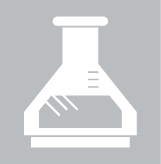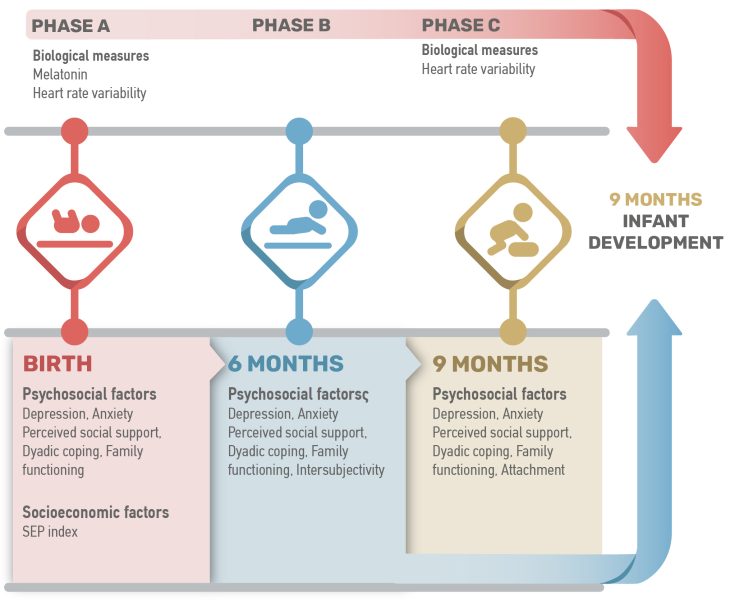The Study
Studying psychosocial and physiological factors related to prematurity invites the Psychology – Medicine interdisciplinary collaboration because: a) premature infants possess behavioral characteristics and have neurological immaturity that may contribute in making them difficult interactive partners (Singer, 2003) and increase their health risks (Javorka, 2017); and b) a steady increase in the neonatal survival rates since the advent of modern intensive care for the preterm infant has been related to a growing concern for preterm infants’ developmental outcome and quality of life (Forcada-Guex, 2006).
Women from low SES and in low-income countries are disproportionally affected by preterm delivery, perinatal depression / anxiety, and lack access to mental health care. This results in economic and social hardships that affect individuals, families and society as a whole, furthering the cycle of poverty and health inequities (Prom, 2022). The implications of this study may highlight the need to advance the debate about the responsibility of society to counteract health inequalities (M’hamdi, 2017) and to interrupt the pattern of intergenerational mental illness and suffering (Prom, 2022). This is important because the perinatal mental health literature has focused on individual women as the main agent for change while social determinants of mental health, such as poverty, are of critical importance for women in the perinatal period (Howard & Khalifeh, 2020). At the economic level, identification of early risk factors for the development of preterm infants may has implications for policymakers since preterm infants incur higher early intervention costs (Clements, 2007).
Main Purpose
The main aim of this study is to investigate the association of certain psychosocial and biological factors across the first year of life of preterm infants’ development, with focus on low socio-economic status families. Thus, we plan to accomplish the following two objectives:
Objective 1: To explore the way psychosocial factors, such as maternal mental health, maternal perception of infant’s intersubjectivity and attachment, across the first year of preterm birth are related with infants’ emotional and cognitive development at 9 months (corrected age). Further, we will explore whether this association varies between infants from low and high SES. In addition, we will investigate whether other characteristics (family functioning, perceived social support and dyadic coping) may be related to these associations and if these characteristics can moderate for the risks posed by low socio-economic status,
Objective 2: To assess the way physiological factors, such as autonomic nervous system maturation, measured according to heart rate variability, is associated with premature infants’ emotional and cognitive development at 9 months (corrected age) and whether this association varies between low and high SES. Further, we will explore whether maternal derived-melatonin through breastfeeding intervenes this association.
Timeline of the ProMote Study



During Phase A of the ProMote study, which takes place immediately after the birth of the newborn, an assessment of specific psychosocial and biological factors will be conducted. More specifically, the following psychosocial factors will be evaluated: maternal depression, maternal anxiety, perceived social support, family functioning, and dyadic coping with stress. Additionally, at the time of the infant's birth, factors related to the family's socio-economic status will also be assessed.
At the same time, during Phase A of the study, melatonin concentration will be measured in breast milk, in neonatal and umbilical cord blood samples, and neonatal and maternal ECG measurements will be conducted.

During Phase B of the ProMote study, which takes place at six (6) months of the infant’s life, the psychosocial factors to be assessed are the following: maternal depression, maternal anxiety, perceived social support, family functioning, dyadic coping with stress, and intersubjectivity.



During Phase C of the ProMote study, which takes place at nine (9) months of corrected age for preterm infants, an assessment of infants’ social and cognitive development will be conducted using the Bayley Scales of Infant and Toddler Development, 3rd Edition (Bayley, 2006).
Additionally, at nine (9) months of age, the following psychosocial factors will be assessed: maternal depression, maternal anxiety, perceived social support, family functioning, dyadic coping with stress, and attachment.
Finally, both infant and maternal ECG measurements will be carried out at the infant’s nine-month mark.
New knowledge to be acquired by the ProMote study
The proposed study is novel in the following ways:
(1) The role of melatonin for preterm infant development is unclear (Tauman, 2002) and under-investigated. Towards this direction, we aim to investigate the role of melatonin on infant development through a suspected multifactorial early developmental pathway combining psychosocial and biological factors;
(2) The proposed study on determinants of premature infant development is longitudinally. Appropriate longitudinal studies for premature infants are scarce. In order to fully recognize the difficulties of children born preterm, it is important to follow them individually, through several developmental stages (Jansen, 2021). Longitudinal studies should be pursued in forthcoming years to deepen our understanding of the pathways leading to heightened risk for adverse developmental outcomes in preterm infants (Provenzi, 2017);
(3)This is a multi-method study including physiological and hormone measures, one observational instrument and self-report validated questionnaires. Using multiple outcome measures in infant research is one way to increase rigor, and at the same time, enable us to more accurately interpret our data (LoBue, 2020);
(4) Evidence on premature infant development is limited in Greece (Koutra, 2012). To the best of our knowledge the proposed study will be the first of this kind in Crete, Greece at a time after the financial crisis and in the course of the pandemic. This is important because the financial crisis of the last decade has increased the number of people living in extreme poverty in Greece and led to partial operation of mental health services (Papadakaki, 2021; Tsobanoglou, 2014; Giannopoulou & Tsobanoglou, 2020). What is more, the pandemic increased income inequalities (Vavoura & Vavouras, 2022) and affected adversely the mental health of Greeks (Parlapani, 2020; Vatavali, 2020). In Crete, poverty and mental health problems, especially for women, are prevalent and interconnected issues. Multiproblem families have been said to be on the rise (Papadakaki, 2021). Further, preterm births constitute a major public health issue in Greece (Vlachadis, 2013). Preterm birth rate has increased fourfold in the past two
Approvals of the ProMote study by Research Ethics Committees
The protocol of ProMote study has been approved by the Research Ethics Committee of the University of Crete (numbers and dates of decision: 103/22.09.2023, 158/15.12.2023 and 38/ 15.02.2024) and by the Scientific Council, according to the positive recommendation of the Working Group of the Ethics Committee, and the Board of Directors of the General University Hospital of Heraklion (reference number: 26636/2.10.2023 and 35546/23.10.2023).

